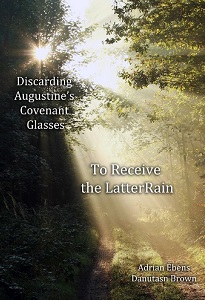By Beholding we Become Changed
2Co 3:18 But we all, with open face beholding as in a glass the glory of the Lord, are changed into the same image from glory to glory, even as by the Spirit of the Lord.
Here is a key principle of the Christian faith – beholding with open face the glory of the Lord, we become changed into the same image. As we behold Christ, (John 1:29) as we feed upon Him, (John 6:51) meditate upon Him and consider Him, (Heb 12:3) we receive of His Spirit (John 15:26) and we become like Him in character.
We aspire to be like Christ in every way. We drink deeply of His character, His trust, His Faith in His Father. We receive of His mind (1 Cor 2:16) and we become like Him. God has promised to complete this work of transformation in us, He has begun the work and He will finish it (Phil 1:6). As we measure Christ, His sacrifice and His work (Rev 11:1,2) we are changed into His image.
The work of being changed into His image requires that what we behold be the same yesterday, today and forever (Heb 13:8). If what we behold in Christ is conflicted in our minds then the work of transformation will become confused. It is upon this point that we must have a clear conception of the identity of Christ, for we will aspire to be like Him in everything, we will copy and imitate everything that we see in Him. Jesus is our everlasting Father in everything (Isa 9:6).
It is certain that as we behold Christ on earth we see an absolute and abiding trust in the Father. Christ depends upon His Father completely and does nothing outside of the will of the Father. As we behold this, we seek to become just like Him. But what about His standing in Heaven; how is Christ presented to us here? Many teach and believe that Christ has a position of complete independence and self sufficiency. A Being who is willing to work with the Father in love but who approaches Him not as one who is indebted in any way to Him for anything. The claim is made that in Christ is life original, unborrowed and underived from anyone even the Father! As we behold this type of Christ, what occurs within our hearts, what do we begin to assimilate? Is there not a clear message sent to us of independence? Such a view of Christ causes us to think that there is not one ounce of dependence in the person of Christ in relation to His Father. There is not one ounce of gratitude in Christ in recognition to the Father that He has received all things from Him. Is this the Christ that we are to pattern after?
The cry goes up “But He is God! We can never be like Him!” It must certainly be made clear that the position given to Christ can never be ours. We can never say with Christ that “As the Father knoweth me, even so know I the Father” (John 10:15). Christ possesses an equality of relationship to the Father that no other being in the universe can understand or appreciate. There are many aspects of His nature that are clearly beyond us, but this does not in any way alter the principles of relationship that must be set before us in a universal context.
The relation of Christ to His Father is the only pattern of relationship given to the universe to understand the WAY to the Father. It is the relationship that Christ possesses with the Father that shows us how we must relate to Him. Christ is set before us as One that we must pattern in every way. He is a beacon to our souls and our hearts are drawn to Him to copy Him in everything.
If Christ is set before us in our minds as One who is not indebted to the Father for all that He possesses then we will copy this in our own lives. But beyond this we will seek to copy both what we see in heaven and what we see on earth. We will be driven to try and become both dependent, trusting and obedient as well as independent, self sufficient and not indebted in any way.
This is just as Satan would have it. Our minds become so completely confused and clouded in our contemplation of Christ that we must conclude it a mystery beyond our comprehension. The work of imitation halts in the way and we speak more and more of the mystery and less and less of the beauty and clarity of the person of Christ.
The work of being changed into the image of Christ requires a Christ that maintains a consistent relation to the Father from beginning to end. Jesus must indeed be the same yesterday, today and forever otherwise the work of transformation will never be completed.
In heaven I behold Christ as One that looks lovingly and devotedly towards His Father. As He possesses all the fullness of His Father’s power, standing in His inherited majesty and immensity, He is looking with gratitude and devotion to the One who gave it all to Him and has shared all of His heart with Him.
It is upon this critical issue that the question of inheritance revolves. It speaks directly to the person of Christ and His relation to the Father. It affects our perceptions of Him as to what we will pattern after. In Christ we see the eternal example of devotion, trust, submission and gratitude to the great source of all. In the very identity and person of Christ we find the secret to righteousness by faith! The key principle is part of His identity! This is why He is the Way, the Truth and the Life. The inheritance of Jesus as expressed in Hebrews 1 is at the heart of the entire gospel process. As A.T Jones stated
In the first chapter of Hebrews, the exaltation, the position, and the nature of Christ as He was in heaven before He came to the world are more fully given than in any other single portion of the Scriptures. Therefore it is certain that an understanding of the position and nature of Christ as He was in heaven is essential to a proper understanding of His position and nature as He was on earth. - Consecrated Way to Christian Perfection Page 12
So what is the Christ that you behold and what image are you assimilating? Do you behold a devoted Son in gratitude to His Father or do you behold an independent and self sufficient Christ that has agreed to work with the Father but owes Him nothing. Let us ponder well what we behold for indeed our life depends on it.




